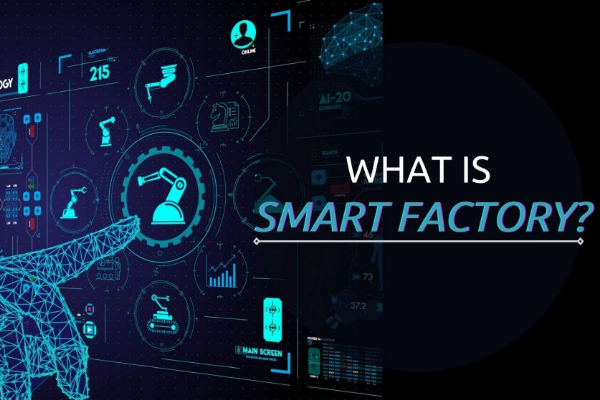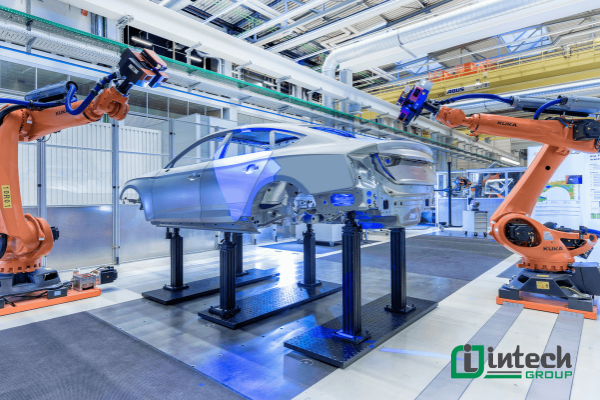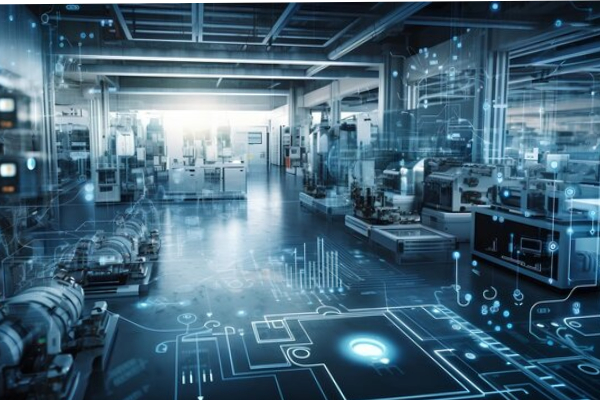What is a Smart Factory? What makes a Smart Factory different from a conventional factory?
15-10-2025 3
In the era of industry 4.0, the term Smart Factory appears more and more, however, not everyone clearly understands this concept as well as its differences. Smart Factory is a breakthrough in the manufacturing industry, transforming from a traditional automated production system to a more flexible, continuous data processing and connection system.
What is a Smart Factory Solution?
Smart Factory describes a manufacturing environment where machines and equipment are capable of improving processes through automation and optimization. A smart factory is not just an automated system, but also a highly digitalized and connected manufacturing facility built on the foundation of smart manufacturing. This is considered an important result of the 4th industrial revolution.

Definitions of Smart Factory
-
A Smart Factory is a manufacturing system that is capable of automation and optimization, allowing machines and equipment to interact and improve processes.
-
A smart factory is a digital facility that uses data from production and business to learn and adapt to new market demands. This factory minimizes downtime, increases predictability and self-adjustment.
-
The Smart Factory vision is a manufacturing environment where logistics and production systems are organized automatically, without human intervention.
-
According to Deloitte Insights, the Smart Factory solution allows the integration of data from various sources such as machinery, production equipment, and supply processes to digitize all operations from maintenance to warehouse management.
-
Smart Factory is the connection between devices and software using artificial intelligence (AI), allowing data analysis and supporting decision making in factory management.
Importance and benefits of Smart Factory
Smart Factory not only helps optimize production processes but also improves business efficiency. Thanks to this system, businesses can respond flexibly to market changes, ensure high performance and save costs. Smart Factory also supports businesses to expand products, develop new markets, and easily integrate advanced technologies into the production process, creating a smart, optimal manufacturing ecosystem.

What makes Smart Factory different from conventional factories?
In the era of the 4.0 industrial revolution, Smart Factory (smart factory) has emerged as an advanced solution, far surpassing the traditional factory model. This is not only a technological breakthrough but also an automated, data-connected and highly flexible production system, helping businesses optimize the entire production process. Below are five main features that make Smart Factory different from conventional factories.
.jpg)
Difference 1: The nature of Smart Factory is connected
The most important feature of Smart Factory is the ability to connect the entire production process and equipment through the Industrial IoT (IIoT) network system and smart sensors. Devices in smart factories can link together and generate real-time data, reflecting production status and current conditions.
This ability helps businesses easily access and continuously update production data, thereby having a comprehensive view, optimizing production efficiency and minimizing downtime. This is an important factor that helps businesses create a more automated, intelligent and efficient production network.
Difference 2: Proactive system
Smart Factory is not only an automated system but also has the ability to operate proactively. This system responds quickly and adapts to market requirements, allowing people to monitor, control and operate production equipment in a smart way. Thanks to the ability to automate and analyze advanced data, Smart Factory minimizes machine downtime, improves forecasting and self-calibration to ensure the highest performance.
Proactive systems also help businesses plan and come up with timely solutions when encountering problems or market fluctuations, ensuring safety and optimization in production operations.
Difference 3: Flexible and agile
Another outstanding feature of Smart Factory is its flexibility and agility. When the market fluctuates, the Smart Factory system has the ability to adapt quickly, from adjusting the production process to expanding the market.
Smart factories have the ability to forecast and react immediately, allowing businesses to change technology and production processes appropriately, promptly meeting new market needs without interrupting the production process. This is a great advantage that helps businesses maintain competitiveness and sustainable development.
Difference 5: Transparent data collection
With Smart Factory, data is collected transparently and intuitively, unlike traditional systems that are difficult to control transparency and accuracy. Smart factories use modern technology to collect and store data from automated production processes, from which people can easily convert this data into detailed information for decision making.
Through transparent data, businesses have a reliable database to develop production and optimize processes.
Difference 6: Optimization capability
Smart Factory has the ability to comprehensively optimize, creating synchronization, consistency and safety in the business's operation chain. Smart factories operate automatically with minimal human intervention but still ensure high productivity and quality, while reducing costs, downtime, and saving energy.
With strong optimization capabilities, Smart Factory brings many benefits to businesses, including:
-
Improving productivity and asset performance.
-
Increasing flexibility and automation in production processes.
-
Improve product quality while preventing risks quickly.
-
Save costs and optimize resources effectively.
Conditions for building a Smart Factory model in Vietnam
The Smart Factory model promises to bring many outstanding benefits to manufacturing enterprises, but to successfully deploy it in Vietnam, it requires fundamental conditions and careful preparation. Below are four basic conditions for building a Smart Factory in Vietnam.

1. Update and apply automation in production
One of the key factors to successfully build a Smart Factory is to update and apply automation technology. This includes applying achievements of the 4.0 industrial revolution, such as IIoT (Industrial Internet of Things), cyber-physical systems, cloud computing, artificial intelligence (AI) and big data. These technologies allow factories to connect intelligently, collect and analyze data in real time to optimize production processes.
The application of automation in production needs to be flexible depending on each industry. Each manufacturing sector has its own characteristics, so businesses need to research carefully to apply automation most effectively, optimize processes and minimize errors in operation.
2. Combination of machines and humans
Many people think that Smart Factory can operate completely automatically without human intervention. However, no matter how modern technology is, it still requires the role of humans in control and decision making. The harmonious combination of humans and machines is an important factor for effective Smart Factory operation.
After applying automation, the role of humans will shift from manual labor to control, monitoring and analyzing data to make production decisions. This requires workers to have skills in technology and automation to control the system, as well as take on complex tasks that machines cannot handle. It can be said that in the Smart Factory model, humans and technology both play important roles and complement each other to form a smart and efficient production process.
3. Finance
Finance is an important factor that greatly affects the implementation of the Smart Factory model. To build a smart factory, businesses need a stable source of capital to invest in modern technology and meet emerging needs. Building a Smart Factory is a long process, consisting of many steps, requiring a detailed financial plan and the ability to tightly control capital sources.
Enterprises need to ensure the ability to invest in appropriate automation solutions and reserve a budget for unexpected situations. In Vietnam, the Smart Factory model is mainly deployed by large enterprises and corporations with strong financial potential, because these enterprises have the ability to invest long-term in technology and automation solutions.
4. Smart manufacturing technology
Technology is the core element of a Smart Factory, including a manufacturing ecosystem with advanced technologies such as IIoT, industrial robots, artificial intelligence, and cybersecurity. The full integration of these technologies not only helps optimize the production process but also ensures the security and safety of the factory system.
Enterprises that own a smart manufacturing technology ecosystem have the ability to improve production efficiency while being flexible in responding to market requirements and fluctuations. Technology integration also helps smart factories easily change and expand when needed.
Intech Group - The leading unit in automation and smart warehouse solutions in Vietnam
Intech Group - Vietnam Engineering and Industry Group Joint Stock Company, is one of the leading companies in the field of manufacturing industrial auxiliary machines in Vietnam, providing advanced solutions to help businesses effectively transform digitally. Intech Group's main solutions include automation, smart warehouses, pallet shuttle warehouses, and custom machine manufacturing.
.jpg)
Intech Group not only provides solutions but also commits to accompanying businesses throughout the process of deploying and operating the system. With a team of professional consultants, Intech Group has become a reliable partner in the process of building smart warehouses, automating production, and other digital transformation solutions. Contact Intech Group to receive dedicated advice and support from a team of experts, helping your business easily access modern technology and improve competitiveness in the current manufacturing industry.

